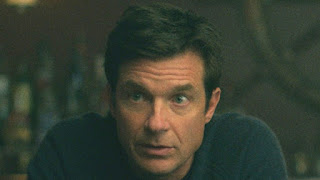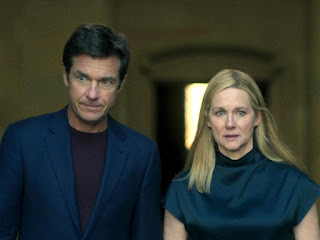
Laura Linney gets some of her juiciest material in her run on the moody drama Ozark as the ruthless matriarch Wendy Byrde, and has a nasty-good time with it. The good reviews are there, the attention is there, and the overdue factor may be too—this show has been a hit since its inception. Tellingly, the Emmys have warmed toward final-season embraces of late: think Jon Hamm of Mad Men, or Claire Foy of The Crown, both winning the first lead-acting trophies on their last try. Linney could easily fit among that company. Wendy’s transformation has been the most radical throughout the course of Ozark. Where once she was simply Marty’s disillusioned wife, she became the icy, unpredictable villain of the show. Look beyond that spoonful-of-sugar smile and she is evil, a modern-day Lady Macbeth capable of sacrificing her own brother Ben. Marty suggests the cartel option to Wendy before accepting Del's offer. They had lost a child recently and Wendy had been told she was basically too old for working as a PR in political campaigns. Marty was looking to cheer up his wife and she needed a distraction. They got straightforward into a nightmare after Marty's partner Bruce started to skim money from the cartel. Many fans really loved Laura Linney for the portrayal of a very complex character and for doing it with such brilliance.

“There’s a lot that I love about this character,” says Linney. “She is constantly changing, going deeper and deeper into a vulnerable place where a survival instinct hijacked her entire being. Which I think fuelled her intellectual decisions, her emotional outbursts, her strategy. She is very shrewd but makes terrible decisions. She’s wildly immature; she’s not wise. And then, as the series goes on, you learn about her mental illnesses and her family: that allowed me a wider berth in which to veer out into more impulsive behaviours.” When Linney first saw the script, however, she thought Wendy needed more depth. The role felt “typical of a female character in a male-driven show”. So she asked that the part be rewritten. “I had no problem being a sideline to Jason Bateman under any circumstances,” she explains. “I just wanted to make if I was going to commit to a multi-year endeavour, I would need to be able to bring something to it that would keep me engaged. If you have just one character that never changes, you can become subconsciously disinterested and start to detach.”
.jpg)
About the current political atmosphere, Linney says: “The Americans are just passing all of these laws that I find really offensive, and for some reason, the swirl of distrust just keeps going around and around. It’s just wrong, deeply wrong.” She takes a breath. “It’s just awful and it’s ignorant; there’s nothing more dangerous to me than ignorance and arrogance. Those two things coupled together are a nasty engine.” Laura Linney talks about how Ozark is a survival story, and “Wendy is just trying to survive“. However, it is not just about surviving for her. Wendy wants to come out with some kind of payoff from the situation. “It’s a real drive that she inflicts upon everyone, and it’s not mentally sound,” she adds. However, Linney denies any comparisons that are being made between Wendy and Lady Macbeth, the conniving queen of the Shakespearean tragedy Othello. Linney says: “She’s not really a villain. But if Wendy showed up in my room, I’d just slide out the door. She scares me.” Source: www.independent.co.uk

In the early days of “Ozark,” Marty Byrde couldn’t be seen screaming or losing his temper. Bateman showed Marty's methodical nature and his reflexive calm even as he watched his business partner get shot in the head and his wife have sex on camera with another man. "In fact the satisfying sound of your lover smacking the pavement is the only thing that gets me to sleep at night," are the calm yet chilling words that Marty uses to reproach Wendy's infidelity. Dan Jackson wrote in a recap of Ozark pilot episode: "As Jason Bateman's Marty Byrde angrily approaches a Chicago office building, fuming about his wife's affair with the smarmy businessman Gary Silverberg, he sees a body smack right against the pavement, hitting the ground so hard a shoe flies off. Some shows might have waited to kill off the character, letting Gary's conflict with Marty stretch out for a whole season, but, as we quickly learned, that's not the Ozark way. Either you're completely disgusted and want to turn the TV off—a totally reasonable reaction—or you're sucked in and can't wait to find out what happens next."
Once New York Times film critic Mike Hale wrote a negative review right after the first season premiered, calling Marty “boring” and “a guy you see at the airport when you buy a ticket.” This review didn’t discourage Jason or made him change how he portrayed Marty. Instead, season after season, we peeled layers of Marty, until one day his cool demeanor is no longer. Speaking about Marty’s character, Jason said, “There’s a reason Marty is not hysterical because he’s the center of all the madness. I knew why I was playing it like that and where I was going with it and how that, hopefully, is going to be satisfying by the time we get to the end of the series.”

Naturally, when you have been part of a show for almost six years, it gets hard to say goodbye. So when Jason Bateman was asked how it felt the last scene he shot with his on-screen wife Laura Linney, he said “there were definitely tears”. About the possible future of the Byrdes, Bateman speculated: “I would bet you that they’ll go up to Chicago and they’ll test this theory of Wendy’s”. While talking about whether the ends will have justified the means for the Byrdes, Bateman said, “My assumption is that, while they’re smarter now than when we first met them, I still feel like their hubris and arrogance will continue to trip them up. I think a sense of humility might guide them towards better decisions, but unfortunately, they are just not there yet.” Lately, Bateman has been re-watching “Ozark” with his wife, but he says his own viewing habits are more limited. He assures he’s seen quite a few episodes of “Friends,” but he never caught the fever of “Breaking Bad,” only the pilot. Bateman started watching HBO’s “The Sopranos,” but stopped after six episodes because he found it hard to get into.

“I watch MSNBC news, until the Dodgers game starts,” Bateman explains. “And then I watch that until I pass out and then finish the last few innings first thing in the morning, rolling into ‘Morning Joe.’ That’s it.” “Delightfully boring” is how Jimmy Kimmel describes Jason Bateman in a phone call. “We’ll go on trips together sometimes, and he’s really good at putting the kids to bed because it means he gets to go to sleep at 9 o’clock.” “He likes to talk but there’s a limited window,” says Jennifer Aniston—another close friend who has been his co-star in “Horrible Bosses” and “The Switch”—“When you’re gathering in a group, Jason gives you maybe an hour. All of a sudden you can see that imaginary window shade sort of pull down. He’s like, ‘Okay, that’s it. I’ve got my time in.” "Jason is perhaps the most adorable human being on the planet. I'm so glad he's having a resurgence," Jennifer Aniston said of Jason Bateman in Harper's Bazaar in 2010.
Bateman describes himself as an introvert. He listens mainly to classical music and does tend to prefer staying at home. Part of this is rooted in his decision to quit partying in 2001, but it also speaks to a lack of pretension, and a perspective of life he formed time ago. When he talks about directing, he gets excited, talking about the challenges, and the problem-solving. He takes particular pride in an early scene in “Ozark” that featured Laura Linney behind the wheel of a boat. He sketched out the single shot on a napkin for the camera operator. Linney says Bateman’s enthusiasm for directing extended to his pushing her to do it, too, even though she had no interest. Her first directing gig was the 11th episode of the final season. When Bateman was directing, she says, his experience and temperament allowed everyone to “take a deep breath, a deep sigh.” Source: vanityfair.com











.jpg)






































